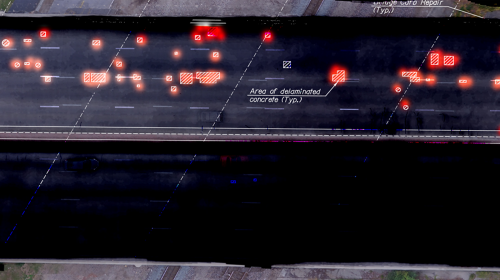Dynam.AI, a provider of end-to-end artificial intelligence (AI) for businesses, and GBA, engineering and architecture solutions developer, have entered a partnership to refine methods of identifying and assessing bridge defects—a market whose potential is underscored in a 2019 American Road & Transportation Builders Association report indicating 47,000-plus crossings deemed structurally deficient.
|
|
| Dynam.AI’s Auguste algorithms can convert data from GBA’s Unmanned Aircraft System (above) into a 3D model (below). PHOTO: GBA |
 |
| 3D MODEL: Analytics Ventures |
The partnership will use the GBA Unmanned Aircraft System (UAS) and Dynam.AI Auguste image detection and classification algorithms with the goal of improving the accuracy, safety and cost effectiveness of infrastructure repairs. Known for its physics-driven artificial intelligence models and techniques, Dynam.AI can convert tremendous amounts of data into a 3D model to visualize anomalies.
“We are constantly looking for new technologies to solve existing problems and found Dynam.AI to be similarly focused on streamlined solutions tailored to a project’s specific needs,” says GBA CEO Tim Ross. “We have created a significantly more efficient approach to collect information to substantiate bridge rehabilitation.”
Collection of data to determine the location and severity of structural deficiencies has traditionally been a manual process requiring ground crews and lane closures, and creating hazards for drivers, road workers and inspectors. As part of a patent-pending methodology, GBA deploys UAS with infrared thermography to evaluate concrete deck, overlayment and bridge joint conditions. The Auguste detection and analysis algorithm converts UAS findings into robust data streams, revealing points of deterioration with higher than 85 percent accuracy and associating them with an understanding of operational costs, timing and overall repair impact. Measured against current practice, the solution could save 70 percent in man-hours and execute in a matter of days a process that previously took six weeks.
“In an environment like bridge rehabilitation, where every percentage point of accuracy counts, precise, consistent and detailed data is paramount,” observes Dynam.AI Managing Director David Ferrell. “The integration of our market-leading AI techniques with GBA’s expertise in UAS technology results in a cutting-edge solution unmatched in its ability to determine with precision the ideal time for departments of transportation to fix decaying infrastructure, allowing them to optimize resource investments and maximize public safety.”
“Using Dynam.AI’s industry-agnostic, platform-enabled solutions, GBA continues to innovate in transportation, as well as across the water, environment, building design, site development, systems integration, and construction management sectors,” adds GBA Advanced Robotics and Remote Sensing Group Leader Ben Lindner. — Dynam.AI, San Diego, www.dynam.ai; GBA, Lenexa, Kan., www.gbateam.com

 Top Flight Technologies Inc., a Boston-based provider of heavy-lift, long range hybrid-electric unmanned aerial vehicles (UAV), has entered a strategic partnership with ready mixed and precast producer Aizawa Concrete Corp., which seeks to deploy new robotic technologies to proactively inspect and maintain concrete infrastructure throughout its home country of Japan.
Top Flight Technologies Inc., a Boston-based provider of heavy-lift, long range hybrid-electric unmanned aerial vehicles (UAV), has entered a strategic partnership with ready mixed and precast producer Aizawa Concrete Corp., which seeks to deploy new robotic technologies to proactively inspect and maintain concrete infrastructure throughout its home country of Japan.